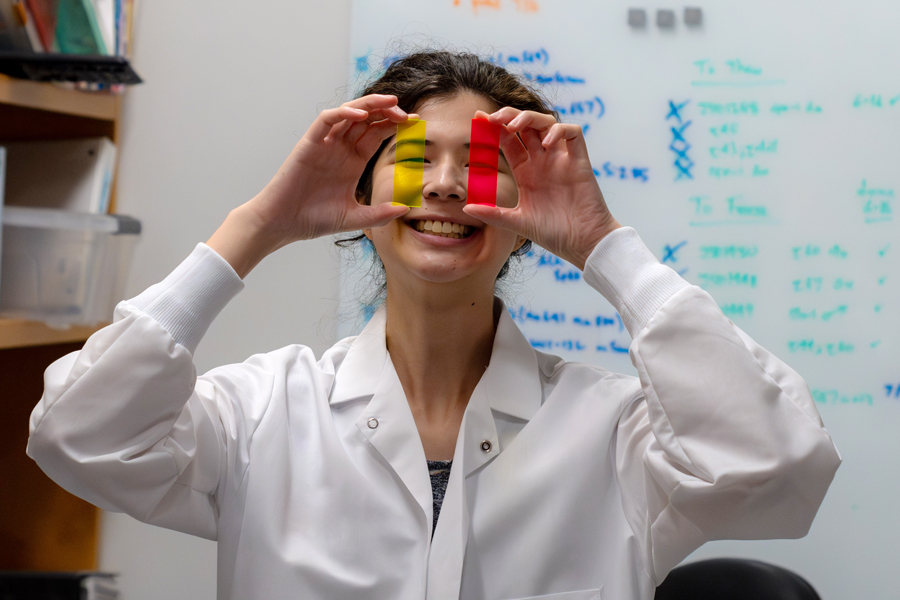Manager of Career and Professional Development
The current Manager of Career and Professional Development is Justine Lottermoser, Ph.D. She was trained at Weill Cornell and is the recipient of a NIH Kirschstein NRSA F31 fellowship. Faculty's time is often in demand for thesis advising, lab mangement, grant writing, teaching, and other administrative responsibilities. The gaps in mentorship that naturally arise are the ones that the Manager of Career and Professional Development fulfills for PhD/MD-PhD trainees and Postdocs.
Click here to learn about services provided.
Click here to learn about Justine.

Maintaining a sense of humor is extremely important. Photo of Justine Lottermoser, Ph.D. holding fluorescent standard slides for a confocal microscope.
Services
It is recommended that each postdoc and student meet with Dr. Lottermoser once per semester at minimum. Students and postdocs are encouraged to schedule multiple meetings per semester, if they deem it necessary.
Overall the role of Manager of Career and Professional Development is critical in supporting trainees and Postdocs to hone necessary skills to succeed in their desired career paths and secure job placement.
Trainees and Postdocs can expect the following support:
- advice on managing mental well-being and emotionally navigating research
- have a document reviewed, f.e. resume/CV/cover letter/specific aims
- help draft an e-mail/prepare for a conversation you may be nervous about
- talk through stuck points in your career decision-making
- practice interviewing or giving a research talk
- connect you with career resources, f.e. What Can You Be With A PhD? Career Symposium (every two years)
- NIH F30/F31/F32 workshop and general grant application advice
- and more!
The Manager of Career and Professional Development will also design and implement methods to track career outcomes of PhD/MD-PhD trainees and Postdoctoral researchers. Part of these efforts include employer outreach and organizing alumni panels and networking events.
Get to know Justine
What did you get your PhD in?
I completed my thesis in Neurosynaptic Biophysics on the complexin C-terminal domain and how it serves a pure localization function to SNARE bundles in synaptic transmission. Turns out the C-terminal domain itself is not essential to the complexin mechanism of inhibiting spontaneous transmission (*gasp*). If you're not tickled by this news, fret not - I will not take it personally. Feel free to ask me more if you are interested. It will help me keep my elevator pitch from getting rusty. You can also read about it here: Lottermoser, Liu, et al. 2025
Why did you choose this role?
Making science accessible is a personal passion of mine, because growing up half-Chinese-American-half-German in Germany while learning German as a second language greatly impacted my grades and delayed my development in self-confidence. Helping scientific trainees navigate academic research and its associated career opportunities brings me the satisfaction of paying it forward. I have more than seven years of organizational experience in coordinating research projects, coaching new trainees, and interpersonal communication. Ever since my third year of graduate school, I have been consistently mentoring new lab members – from postdocs to technicians – in research skills, literature, and assisting them in the resolution of complex issues – both scientific and interpersonal.
What experiences are relevant to your current role?
The soft skills I have acquired were just as big a part of my PhD training as the science. At my graduate school, Biochemistry and Biophysics faculty approached me to evaluate the new department chair candidates as a student representative to the hiring committee. Throughout my training I have often been asked to speak with recruits and junior graduate students with the aim of nurturing a sense of community. Similarly, the molecular biophysics training program directors asked me to co-lead a data-based seminar about gender representation and sexual harassment within the biophysics field for faculty and trainees. In terms of scientific soft skills, I bolstered my written and verbal communication skills by publishing papers and giving talks to audiences ranging from high schoolers to Nobel laureates during my PhD. Doing so has enabled me to receive awards for scientific communication and a Kirschstein NRSA F31 fellowship.
How can trainees and Postdocs get in touch with you?
PhD/MD-PhD trainees and Postdocs should not hesitate to reach out. You can reach the Manager of Career and Professional Development here:
Justine Lottermoser, Ph.D. 450 Clarkson Ave. BSB 3-114A Brooklyn, NY 11203justine.lottermoser@downstate.edu
718-270-2739
justine.lottermoser@downstate.edu
718-270-2739